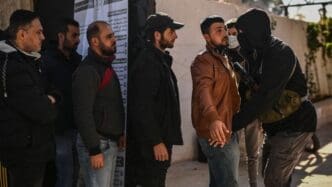In a significant development, former security forces of the Assad regime in Syria have begun surrendering their weapons to a transitional government linked to rebel factions. This action marks a step forward in the power transition in southern Syria, particularly in the city of Latakia, as reported by a video from Agence France-Presse.
The footage captures numerous men in civilian attire lining up to hand over their personal firearms to officials of the new government’s Ministry of Interior. The process involves informal interviews and the taking of mugshots by the officials at the site. Piles of assorted handguns and ammunition are evident in the corners of the government office, indicating the scale of disarmament.
This move aligns with the efforts of Syria’s new leadership, spearheaded by Hayat Tahrir al Sham (HTS), to achieve a peaceful transfer of power and gain international recognition. Mohammad Al-Bashir, a leader connected to the rebel-linked government, has assumed the role of caretaker prime minister. His government is tasked with overseeing the transition until the formation of a new government by March 2025, as he stated in a recent televised address.
During this transitional period, ministers from the previous HTS-linked Salvation Government and ex-Assad-era civil servants will continue their roles. This continuity aims to facilitate a stable governance framework. Meanwhile, Abu Mohammad al-Jolani, the HTS leader now recognized by his real name Ahmad al-Sharaa, addressed international concerns in an interview with BBC, emphasizing that Syria poses no threat to the global community and calling for the lifting of sanctions imposed on the previous regime.
Al-Jolani, who faces international sanctions and leads a group designated as terrorist by various global entities, asserted the group’s non-involvement in activities justifying such a label. He highlighted the necessity of respecting Syrian cultural values and his support for women’s education, advocating for inclusive dialogues to represent all voices.
Recently, Jolani met with UN Special Envoy for Syria Geir Otto Pedersen in Damascus. The envoy expressed hope for a swift lifting of sanctions to enable Syria’s reconstruction. Parallel to UN interactions, the US, EU, UK, Qatar, and Turkey have also established communications with the ruling rebel factions, indicating a shift in diplomatic engagements toward Syria’s evolving political landscape.
In addition to Latakia, other cities like Daraa have witnessed similar disarmament initiatives. Syrian state media reports that upon handing over their weapons, former regime forces receive temporary cards permitting their movement in liberated areas while pending legal proceedings are finalized.
Historically, the Assad regime has been linked to severe human rights violations during its crackdown on political dissent, including extensive use of chemical weapons, which resulted in numerous civilian casualties. The UN Human Rights body estimates over 306,000 civilian deaths from the conflict’s inception in 2011 to early 2021.
The disarmament of former Assad regime forces signifies a noteworthy shift in Syria’s tumultuous political landscape. As transitional governance takes hold under HTS’s leadership, the focus remains on achieving international legitimacy and rebuilding efforts amid calls for lifting sanctions. This framework intends to address the longstanding issues rooted in years of civil conflict, with hopes pinned on a peaceful transition.








